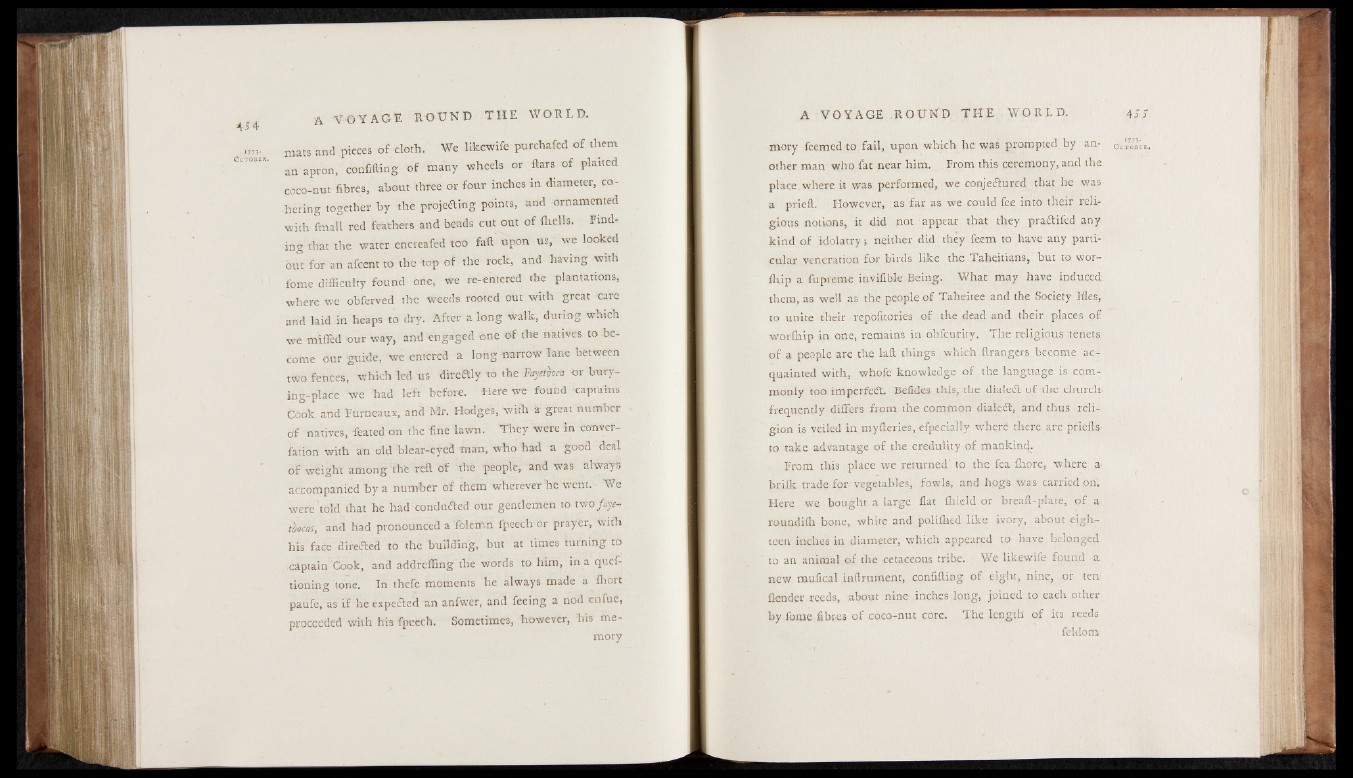
1773*
October.
mats and pieces of cloth. We likewife purchafed of them
an apron, confifting of many wheels or ftars of plaited
coco-nut fibres, about three or four inches in diameter, cohering
together by the projeding points, and ornamented
with fmall red feathers and beads cut out of Ihells. Finding
that the water encreafed too fall upon us, we looked
out for an afcent to the top of the rock, and having with
fiome difficulty found one, we re-entered the plantations,
where we obferved the weeds rooted out with great care
and laid in heaps to dry. After a long walk, during which
we miffed our way, and engaged one of the natives to become
our guide, we entered a long narrow lane between
two fences, which led us diredly to the Fayetwca or burying
place we had left before. Here we found captains
Cook and Furneaux, and Mr. Hodges, with a- great number
of natives, feated on the 'fine lawn. They were in conver-
fation with an old blear-eyed man, who had a good deal
of weight among the reft of the people, and was always
accompanied by a number of them wherever he went. "We
were told that he had conduced our gentlemen to two faye-
toecas, and had pronounced a ‘foiemn fpeech or prayer, with
his face directed to the building, but at times turning to
ciptain Cook, and addreffing the words to him, in a quef-
tioning tone. In thefe moments he always made a fhort
paufe, as if he expedited an anfwer, and feeing a nod enfue,
proceeded with his fpeech. Sometimes, however, his memory
mory feemed to fail, upon which he was prompted by an- oc/oit*.
other man who fat near him. From this ceremony, and the
place where it was performed, we conjectured that he was
a prieft. However, as far as we could fee into their religious
notions, it did not appear that they practifed any
kind of idolatry ; neither did they feem to have any particular
veneration for birds like the Taheitians, but to wor-
ffiip a fupreme invifible Being. What may have induced;
them, as well as the people of Taheitee and the Society Ifles,
to unite their repofitories of the dead and their places of
worfhip in one, remains in obfcurity. The religious tenets
of a people are the laft things which ftrangers become acquainted
with, whofe knowledge of the language is commonly
too imperfeCt. Befides this, the dialed of the church,
frequently differs from the common dialed, and thus religion
is veiled in myfteries, efpecially where there are priefts-
to take advantage of the credulity of mankind.
From this place we returned' to the fea fhore, where a.
brifk trade for vegetables, fowls, and hogs was carried on.
Here we bought a large flat ffiield or breaft-plate, of a
roundiffi bone, white and poliffied like ivory, about eighteen
inches in diameter, which appeared to have belonged
to an animal of the cetaceous tribe. We likewife found a
new mufical inftrument, confifting of eight, nine, or ten
flender reeds, about nine inches long, joined to each other
by fome fibres of coco-nut core. The length of its reeds
feldom